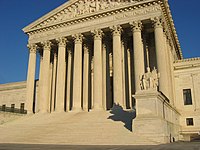
Photo from wikipedia
Landmark Supreme Court rulings determine American law by adjudicating among competing reasonable interpretations of basic political rights. Jeremy Waldron argues that this practice is democratically illegitimate because what determines the… Click to show full abstract
Landmark Supreme Court rulings determine American law by adjudicating among competing reasonable interpretations of basic political rights. Jeremy Waldron argues that this practice is democratically illegitimate because what determines the content of basic rights is a bare majority vote of an unelected, democratically unaccountable, elitist body of nine judges. I argue that Waldron's democratic critique of judicial review has implications for real-world reform, but not the implications he thinks it has. He argues that systems of legislative supremacy over the judiciary are democratically preferable to the American one. I provide reasons why his argument is unsound and explain that, properly construed, Waldron's premises support implementing a system where ordinary citizens chosen by lottery participate in a deliberative mini-public to vote on which reasonable interpretation of a basic political right will become the law of the land.
Journal Title: Journal of the American Philosophical Association
Year Published: 2022
Link to full text (if available)
Share on Social Media: Sign Up to like & get
recommendations!